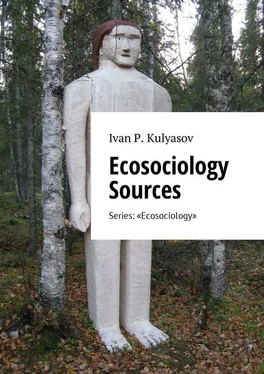I. Kulyasov - Ecosociology Sources. Series - «Ecosociology»
Здесь есть возможность читать онлайн «I. Kulyasov - Ecosociology Sources. Series - «Ecosociology»» — ознакомительный отрывок электронной книги совершенно бесплатно, а после прочтения отрывка купить полную версию. В некоторых случаях можно слушать аудио, скачать через торрент в формате fb2 и присутствует краткое содержание. ISBN: , Жанр: Прочая научная литература, на английском языке. Описание произведения, (предисловие) а так же отзывы посетителей доступны на портале библиотеки ЛибКат.
- Название:Ecosociology Sources. Series: «Ecosociology»
- Автор:
- Жанр:
- Год:неизвестен
- ISBN:9785449009913
- Рейтинг книги:5 / 5. Голосов: 1
-
Избранное:Добавить в избранное
- Отзывы:
-
Ваша оценка:
- 100
- 1
- 2
- 3
- 4
- 5
Ecosociology Sources. Series: «Ecosociology»: краткое содержание, описание и аннотация
Предлагаем к чтению аннотацию, описание, краткое содержание или предисловие (зависит от того, что написал сам автор книги «Ecosociology Sources. Series: «Ecosociology»»). Если вы не нашли необходимую информацию о книге — напишите в комментариях, мы постараемся отыскать её.
Ecosociology Sources. Series: «Ecosociology» — читать онлайн ознакомительный отрывок
Ниже представлен текст книги, разбитый по страницам. Система сохранения места последней прочитанной страницы, позволяет с удобством читать онлайн бесплатно книгу «Ecosociology Sources. Series: «Ecosociology»», без необходимости каждый раз заново искать на чём Вы остановились. Поставьте закладку, и сможете в любой момент перейти на страницу, на которой закончили чтение.
Интервал:
Закладка:
In fact, the modern-day socio-ecological concepts advocated by sociologists-ecologists emphasize and maintain that social interaction and development do not occur in emptiness and not in the social environment alone but also occur in the natural environment. And, in the context of a local ecological catastrophe of an anthropogenic nature or when the global ecological crisis is looming ahead, it becomes the main factor that determines interaction and development of society. Therefore, the nature-related character of social atomism, which theoretically could be combined with the evolutionary character of social change, was identified as early as a century ago.
Chicago school of sociology
The postulates of ecologism were appreciated and reproduced in the 1920s in the classical socio-ecological concept of the Chicago school of sociology. Below we will consider this in more detail. At this point, it should be emphasized that the methodological framework for socio-ecological research of the Chicago school of Sociology was provided, aside from the European schools of thought, by the ideas of the Chicago school of philosophy, formed earlier on. This concept is characterized by pragmatism and instrumentalism that combine philosophical humanism, sociological naturalism, social evolutionism and reformist ecological activism, including that of an individual.
The ideas proposed by the Chicago school sociologists were based on the evolution of the social, psychic and moral nature of the human, who emerged at a certain level of development of organic life and who remains dependent on the character and results of his interaction with the surrounding natural and social environment. Relationships between society and the environment change (and are changeable) by efforts of humans and the natural environment. Therefore, the task of a sociologist is not only theorizing, once the general patterns of such relationships and links are instrumentally identified, describing their structures and mechanisms, but also identifying best cases and practices that harmonize the life of humans in the environment. This can provide an example for everyone to follow, and a social reform to create conditions for its implementation, could be proposed to the government and business.
George Herbert Mead (1863—1931), together with other philosophers of the Chicago school, developed the idea of pragmatism, which maintains that truth and sense found in the cognitive process must have a hands-on value. This approach, motivated by the processes of urbanization and migration, brought new social issues and posed a problem requiring practical resolution by scientists.
He proposed the idea of symbolic interactionism: people differently respond to the same act by other people depending on the symbols apportioned to such other people. In the urban context of Chicago in the early 20 thcentury, this translated into a situation when migration, uncontrolled by the city, led to the emergence of national ghettos and to other social problems. However, Mead was able to prove that these social problems were also caused by the way how a person perceives another person through symbols rather than via behavior 12 12 Mead G.H. Mind, self and society from the standpoint of a social behaviorist. 1934.; The philosophy of the act. Ed. C. Morris. Chicago: University of Chicago Press. 1938.
.
This is a common mistake of cognition caused by the pragmatism of deceit and self-deceit. In the beginning, one generalizes the behavior of a social group, creating symbols, which are then apportioned to such group, whether males or females, peoples or countries, people of other faith or neighbors. After that, these symbols / assumptions are carried over to specific persons who have the identity or status of such group. The biggest problem is when spontaneous behavior of a specific person is not taken into account, when the desire to create social inequality, place oneself above this person and thus justify the suppression, violence or destruction being perpetrated, prevails. This situation was typical for uncivilized societies. In civilized societies, it is balanced by the legal system. While also being an instrument of violence that creates social inequality, court considers criminal acts of specific individuals.
If an ecosociologist, having summarized the results of a group research, the participants of which share the same identity or status, identifies a different behavior of a specific member of the group, he understands that this person realizes other identities and statuses that were unaccounted for by the sociologist, temporary situations, personal inclinations and so on.
John Dewey (1859—1952) made a significant influence on ecosociology as he developed the idea of instrumentalism within the framework of pragmatism. In his works, he maintained that the human nature combines biological and social components because they are functionally identical. This idea of biosocial parallelism implied that human instincts and social behavior are equivalent and need to be satisfied. After that, he only had to elaborate an instrumental base, i.e., methodologies of sociological research aimed at satisfaction of vitally important needs.
Where a need arises due to a disruption in the optimal functioning of the human organism in the ambient environment, its satisfaction is aimed at restoring equilibrium in interaction with the environment, and achieving the optimum. This implies a preliminary sociological study of a given situation, the interaction itself and its consequences for gathering of research materials. A sociologist may resort both to spontaneity and to experiment.
Individual experience is understood as integrity, interrelation, versatility, uniqueness and inseparability of things natural and social, organic and psychic, subjective and objective. This unity is a condition of freedom, expedience and responsibility, realization of all abilities inherent to human nature. This is the main task of a researcher – to develop empirical, including experimental techniques for distinguishing between moral and immoral behavior, help conduct political reforms aimed at transformation of qualities inherent to human nature.
Dewey regarded examples of interaction between individual actors (agents) in specific social formations (associations) as being the subject of empirical research. He viewed society as the process of association and communication when experiments, ideas, values become common for the participants. He was especially attracted to the ideal of creative democracy – a social organization with a minimized social control over individual manifestation of creative self-realization that rules out bureaucratic and hierarchical relationships.
At the same time, admitting that changing the human nature in order to achieve this ideal would be difficult, he was trying to address this issue as a pedagogue. Believing that only a useful knowledge is true and valuable, he developed school programs where, in the beginning, children were learning through play and afterwards – through teamwork and individual labor. For him, it was obvious that aside from biological restrictions, there exist social restrictions. Accordingly, another important aspect of education was to teach children the skills of adaptation to the ever-changing social and natural environment 13 13 Dewey J. Democracy and education: An introduction to the philosophy of education. New York: Macmillan. 1916.; Human nature and conduct: An introduction to social psychology. New York: Holt. 1922.; Experience and nature. Chicago. 1925.; Logic: The theory of inquiry. New York: Holt, Rinehart, Winston. 1938.
.
These ideas formed the philosophy of action, where a person actor (homo actor) performing the social role delegated to him, turns into an activist (homo active) characterized by natural morality and consciously choosing between his physical actions. This demonstrates realism and naturalism of the individual stream of experience, which is opposed to “bare” mentalism. However, this philosophy does not provide for nature’s development outside human actions and shows no interest for natural conditions, which may lead to extinction of the human race. Conditions resulting from the actions of humans and which could also lead to extinction of the human race were not studied either. Understanding of this and specific socio-ecological problems encouraged the elaboration by the Chicago school of sociology of the classic social concept of human ecology.
Читать дальшеИнтервал:
Закладка:
Похожие книги на «Ecosociology Sources. Series: «Ecosociology»»
Представляем Вашему вниманию похожие книги на «Ecosociology Sources. Series: «Ecosociology»» списком для выбора. Мы отобрали схожую по названию и смыслу литературу в надежде предоставить читателям больше вариантов отыскать новые, интересные, ещё непрочитанные произведения.
Обсуждение, отзывы о книге «Ecosociology Sources. Series: «Ecosociology»» и просто собственные мнения читателей. Оставьте ваши комментарии, напишите, что Вы думаете о произведении, его смысле или главных героях. Укажите что конкретно понравилось, а что нет, и почему Вы так считаете.




![Джеймс Купер - Пионеры, или У истоков Саскуиханны [The Pioneers, or The sources of the Susquehannah]](/books/395797/dzhejms-kuper-pionery-ili-u-istokov-saskuihanny-t-thumb.webp)







